PDF for download
“The role genetics/genomics research can play in forest management is huge but, unfortunately, remains under-utilized,” said Dr. Om Rajora, Professor of Forest Genetics and Genomics at the University of New Brunswick, Canada.
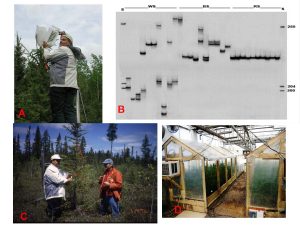
A. Controlled pollination in black spruce to produce F3 progeny at Petawawa Research Forest; B. DNA fingerprints of 10 individuals each of white spruce (WS), black spruce (BS) and red spruce (RS) at a genic microsatellite showing genetic diversity; C. Sampling of old-growth and post-harvest second-growth black spruce to examine the genetic effects of forest harvesting and renewal practices in Manitoba (Rajora and Pluhar 2003, Theor. Appl. Genet. 106: 1203-1212); D. Testing of three-generation outbred pedigree of black spruce under ambient and elevated CO2 conditions for QTL mapping of traits related to acclimation and adaptation to climate change. All pictures were taken by Dr. Om Rajora or his associates.
“Genetics/genomics research can greatly assist the management of natural and planted forests by conserving healthy, productive, well-adapted and genetically diverse natural forest and developing high yielding tree varieties with desired traits for deployment in plantations,” he said.
Dr. Rajora is the organizer and coordinator of a session entitled Genetics and Genomics for Conservation, Climate Adaptation and Sustainable Management of Forests to be presented at the IUFRO 125th Anniversary Congress in Freiburg, Germany in September. Read more…
PDF for download
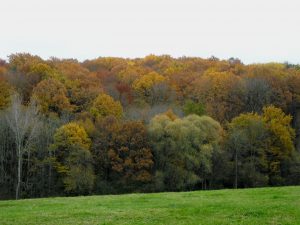
Autumn leaves in a mixed-species forest of France. Photo by Damien Bonal, one of the co-authors of the review.
An increasing number of studies demonstrate that mixed forests can deliver many ecosystem services at a higher level than pure forests.
Today, however, less than 0.1% of plantation forests worldwide are made of mixed tree species. And, by the end of this century there is the potential for about 20% of the world’s forest area to be represented by planted forests.
“More efforts should be made to develop new mixed, planted forests,” said Dr. Hervé Jactel of the French National Institute for Agricultural Research. He is one of the authors of a new review, Tree Diversity Drives Forest Stand Resistance to Natural Disturbances, which reviews the relationships between tree diversity and stand resistance to natural disturbances, and explores the ecological mechanisms behind the observed relationships. Read more…
PDF for download
There’s a line in a song by U.S. singer-songwriter Dee Moeller that goes: “The wide open spaces are closing in quickly, from the weight of the whole human race…”
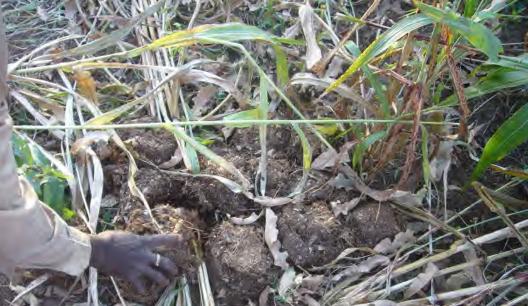
Elephant dung found on a village farm, with crop damage, nearby Pendjari Biosphere Reserve (Northern Benin). Credit Dr Chabi DJAGOUN
That line could well be the sub-title for a session to be held at the upcoming IUFRO 125th Congress in Freiburg, Germany entitled: Co-existence of humans and wildlife in changing landscapes and climate.
Current human population growth is causing an increasing demand for natural resources and a growing pressure for access to land which, among other things, affects wildlife habitat and the interactions between wildlife and humans, said Dr. Chabi Djagoun, of the Laboratory of Applied Ecology in Cotonou, Benin. Read more…
PDF for download
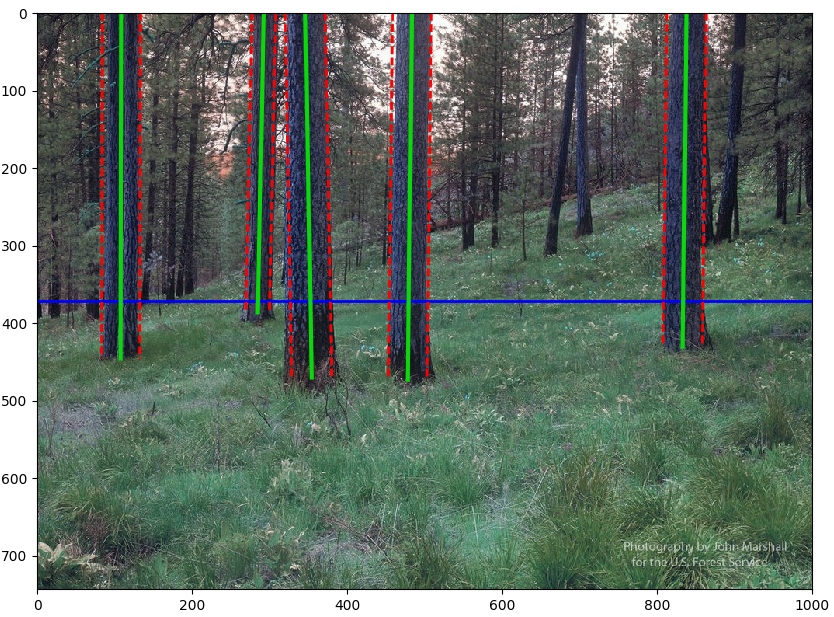
A 3D machine vision technology developed to detect and measure tree characteristics real-time during thinning operations. (Credit: Lucas Wells, Oregon State University)
“We’re trying to avoid throwing the baby out with the bathwater,” said Dr. Jens Peter Skovsgaard of the Swedish University of Agricultural Sciences in Alnarp, Sweden.
He was speaking about forestry operations and research and how change can be evolutionary rather than revolutionary. Dr. Skovsgaard is coordinator of a session entitled: Forestry “Classic” for the Future, at the IUFRO 125th Anniversary Congress in Freiburg, Germany in September. Read more…
PDF for download
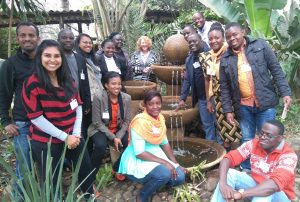
Training workshops for early and mid-career forest scientists across FORNESSA countries contribute to enhancing research competence and networking. (Photo by Michael Kleine, IUFRO)
Collaboration and cooperation are the keys to facilitating learning and making better use of research outcomes in sub-Saharan African countries facing severe forestry challenges.
That’s the philosophy behind Dr. Joseph Cobbinah’s upcoming session on the impact of forestry research on policy, livelihoods and economic development in sub-Saharan Africa. The session will take place at the IUFRO 125th Congress in Freiburg in September. Read more…
PDF for download
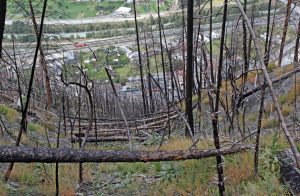
Forest fire in protection forest (Photo U. Wasem/WSL)
In mountainous terrain they are called protection forests – forests that protect human settlements and infrastructure against natural disturbances such as rockfall, snow avalanche and shallow landslides.
Natural disturbances are becoming more and more important drivers in many mountain chains worldwide, mainly because of past land-use legacies. But also, under climate change, the incidence of some natural disturbances is increasing.
These disturbances and their interactions can threaten human life and property and can compromise the protection function of mountain forests. Read more…
PDF for download
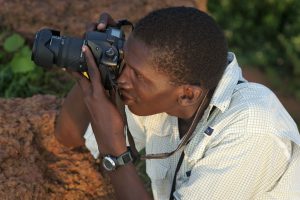
Involving the public in the scientific process is a primary objective. (Photo Pixabay)
The coordinator of a session on citizen science planned for the IUFRO 125th Anniversary Congress is aiming high.
He hopes the session will inspire discussion about the merit and potential of a global initiative on invasive forest pest monitoring, with special emphasis and resources for countries with developing economies.
The focus is on invasive species because people are major drivers of their spread. Consumer demand drives globalization and the international trade in ornamental plants, which is a major contributor to the invasive problem. Read more…
PDF for download
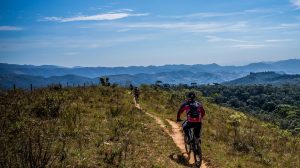
Tourism and recreation should receive just as much thought, science, and funding as other forest uses. (Photo Pixabay)
Dr. Taylor Stein of the University of Florida in Gainesville believes “that any meeting that addresses the management of the world’s forests is incomplete without a focused discussion on tourism.”
While there is limited research on the impact of nature-based tourism, Dr. Stein pointed to a 2007 report from the Center for Responsible Travel that said nature-based tourism accounted for 7% of the international tourism market and had a $77 billion impact on the world’s economy.
And, he added, surveys of travelers around the world consistently show that natural attractions (e.g. wildlife) are important reasons for their visits and they value conservation and protection of environmental quality.
Read more…
PDF for download
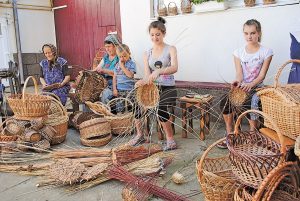
The village of Iza in Transcarpathian Ukraine is famous far beyond the region’s borders for its wicker products. Most villagers are involved in the business.
http://ukurier.gov.ua/uk/articles/selo-iza-na-zakarpatti-postachaye-virobi-z-verbi-d/
Many rural forest-dependent communities face similar challenges – lack of infrastructure, housing, and transport as well as aging populations.
When global issues such as climate change, sustainability, and energy and food security are added to the mix, the need for solutions to the challenges becomes much more pressing. Read more…
PDF for download
Private owners control nearly 70 million hectares of forestland around the globe and account for well over 50% of the forestland in many countries in Europe and North and South America.

What does the future hold for owners of forestland? (Photo Pixabay)
These owners – many of them families, individuals and other small holders – operating within social, financial and political constraints, will largely dictate the future of the forests.
That is the underlying reason for a session at the upcoming IUFRO 125th Anniversary Congress in Freiburg, Germany in September entitled: History, Findings and Future Directions of Forest Landowner Research.
Dr. Brett Butler, of the U.S. Forest Service, is coordinating the session and says: “There are numerous individual researchers and institutions that study these private owners, but the opportunities to directly compare findings and methods across countries are limited. Read more…










